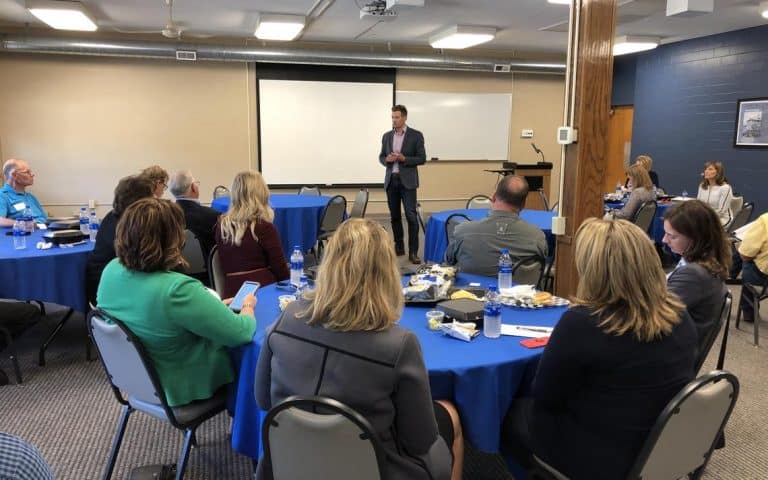WILLMAR—While taking tours across Minnesota, Steve Grove has heard about the economic success stories as well as the economic challenges communities are experiencing.
On Thursday, Grove—the commissioner of the Department of Employment and Economic Development—was in Willmar touring local businesses and hearing from community leaders about those challenges and opportunities.
Grove had high praise for what he saw.
“The way this community has embraced its growing workforce, its immigrant workforce, and is navigating those challenges is really a model for the rest of the state,” Grove said in a brief interview following an hour-long question-and-answer exchange with about 30 business and community leaders at the MinnWest Technology Campus.
He cited efforts by Jennie-O Turkey Store to grow its workforce, the community collaboration to create a new child care center in Spicer and the success of MinnWest as an economic and innovation powerhouse.
Grove was also impressed when he heard about Kandiyohi County’s CEO (Creating Entrepreneurial Opportunities) program that helps area high school entrepreneurs develop business plans.
Some of the issues that were identified as challenges to economic growth include a shortage of child care, inadequate internet service and the current agricultural economy.
Grove, a Minnesota native, worked at Google in California for 12 years before being appointed as DEED Commissioner earlier this year by Gov. Tim Walz.
Grove said he learned a lot by working at Google, but one thing he’s already learned while working at his first government job is that government “doesn’t work at the same pace” as Google.
Grove said the state’s economy needs a “lot of fresh looks” and that DEED is determined to retool itself and take a holistic approach to better meet the demands of businesses that need workers, and workers who need jobs.
Grove said there are two open jobs for every one person searching for one, and that DEED’s job is to grow the state’s economy for everyone.
“We are really looking at how we can build a workforce that meets the needs of our businesses now and in the future, how we can reduce disparities in our economic landscape for the populations of color and people who face disadvantages and how can we build an innovation economy in this state that is an actual leader,” he said.
Grove said reducing disparities in the workforce is “not just a moral question. It’s an economic one.” He said in the next 10 years that 70% of the state’s population growth will come from people of color and they need good-paying jobs.
He said one of DEED’s jobs is to “fill the gaps” by providing opportunities to business owners and startups, such as training, tax credits and grants and then to “get out of the way” and let entrepreneurs carry the growth.
That issue of getting government out of the way was reiterated by Rep. Tim Miller, R-Prinsburg, who said that “many layers of government” have slowed down the “entrepreneurial spirit.”
Rep. Dave Baker, R-Willmar, who is a business owner in Willmar, said business owners are the best people to decide when wages should be increased. “I get concerned when government tries to over-fix things.”
Kandiyohi County Commissioner Harlan Madsen cautioned, however, that the “baby shouldn’t be thrown out with the bath water” and that some government regulations can prevent “chaos.”
Grove said it should be a “pleasure to start a business in Minnesota” and if it isn’t, then DEED needs to figure out why.
Technology and innovation were key words in Grove’s presentation in Willmar.
He said DEED hopes to “grow a truly innovative economy here in Minnesota and to be a top-five innovation ecosystem in the country.”
Grove said states that are investing in startup companies are doing very well economically, and those that aren’t are being left behind.
He said it’s important that all communities in Minnesota, not just the metro area, are “growing an ecosystem that’s great for startups.
West Central Tribune by Carolyn Lange

